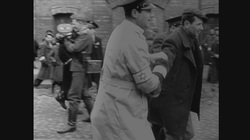|
Once I saw the trailer for A Film Unfinished, I knew I had to see it. Though horrified by the images of life in the Warsaw Ghetto in 1942, I wanted to know the truth. Rarely, is the truth clear cut, as this film so aptly demonstrates. After WWII, an unfinished Nazi propaganda film was discovered in a concrete vault. The silent hour-long rough cut portrayed life in the Warsaw Ghetto.  Shot over 30 days, in May 1942 —just two months before the Nazis started sending the Ghetto’s Jews to Treblinka—the film highlights extremes of poverty and luxury. Edits juxtapose scenes of people dying of starvation on the sidewalks with views of a fancy dinner party. For nearly half a century historians used the film as a record of life in the Warsaw Ghetto. Then in a film vault at an American Airbase, a British researcher stumbled on two film cans lying on the floor titled "Das Ghetto". Inside—30-minutes of footage left on the cutting room floor when the Ghetto film was made. The outtakes clearly showed the film crew had staged many of the scenes. Some caught cameramen accidentally filming one another. Tragically, the scenes of profound suffering and death are not the fakes. Face after face appears, eyes vacant, skin taut over bone. A fly buzzes and lands. A hand too weak to brush it off. I want to look away, but I don’t. I open myself to see each face that flashes on the screen as an individual human being. That man had a wife and children. That woman had plans and hopes, just like I do. That person never imagined his life would turn out like this. I look at each skeletal body shown sliding down a chute into the mass grave. I make myself a witness to the human dignity of each one. Because that is an undeniable truth. An editor advised me to get rid of the rhetorical questions in my novel. So I changed them all to declarative statements.
No. He said that wasn’t good enough. I really had to get rid of them. “But will the reader understand what I’m trying to say?” I asked. After all we were talking about my all-important climax scene. My main character was weighing her options, deciding a question that would set the direction for her life. “You’re asking the wrong question,” said the editor. “You must trust yourself. And you must trust your reader.” My rhetorical questions signaled my insecurity—Demon # 164. To write well, I must believe in myself. Pounding the reader over the head with sentences explaining what I want my reader to “get” is a sure sign that I do not trust my storytelling. Have I laid the foundation for the reader to understand my character’s predicament? Have I written a story with emotional depth? These are scary questions to face after working years on a novel. But they must be asked. If I have accomplished these crucial tasks, it does not matter if readers “get” what I’m trying to say. Readers bring their own lives to the novels they read. They get what they need to get. If I have not done the groundwork, if I have not written a story that thrums with authentic human emotion, no amount of rhetorical questions will do it for me. If I have written a beautiful story that rings with the universal truth of the human experience, rhetorical questions and similar techniques that hammer information like a ten penny nail will confuse, rather than enlighten, the reader.  Outside my window My part of the world is glorious! The weather this first week of November could fool me into thinking it’s early October. It’s sunny, and warm enough to run without sleeves. All I want to do is walk through the neighborhood and look. Look at every single leaf. Run and laugh and gaze with wonder at the blue sky. Does anyone say it better than Edna St Vincent Millay? O world, I cannot hold thee close enough! …Thy woods, this autumn day, …all but cry with colour! …Lord I do fear Thou’st made the world too beautiful this year. Checklists help us get things in order. They’re a means of managing, staying in control. Or, at least, they prop up that illusion. But we have to start where we are, so if a checklist is what we’ve got to work with—start checking. Recognize any of these demons?
□ Procrastination □ Doubt □ Writers’ block □ Fear of failure □ Fear of success □ Loneliness □ Fatigue □ Self-criticism □ Rejection □ Despair If you have all or many of these, often on a daily basis, what does it mean? It means you’re a writer. It doesn’t mean you’re crazy, a loser or doomed forever. If you worked as an accountant, computer engineer or teacher you might wake up Monday morning with some of these feelings, but you would brush your teeth, get dressed and go to work as usual. You’d put these negative feelings and behaviors aside and do what you’re supposed to do. But when you’re a writer and these demons come, it a whole different story. Try putting them aside, chasing them away or pretending they don’t exist and you’ll never write anything of consequence. Trouble is, most of us have never been taught to invite the demons in for a latte. There is no class in high school titled Learn Not to Deny and Stuff Emotion or Be Your True Self Even If People Don’t Like You. For many of us, high school was a training ground for Denying and Stuffing Emotion 101. We learned, probably even before we went to school How to Hide Our True Selves So We Don’t Get Hurt. But it’s a writer’s job to bring emotion to life on the page. If we want to write with any sense of truth, we need to experience our full range of feelings. You could start now. Recognize what you’re feeling at this moment. Notice and possibly name it. |
I'm fascinated to discover little-known history, stories of people and events that provide a new perspective on why and how things happened, new voices that haven't been heard, insight into how the past brought us here today, and how it might guide us to a better future.
I also post here about my books and feature other authors and their books on compelling and important historical topics. Occasionally, I share what makes me happy, pictures of my garden, recipes I've made, events I've attended, people I've met. I'm always happy to hear from readers in the blog comments, by email or social media. Archives
September 2023
Categories
All
|


